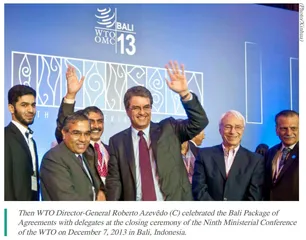World Trade Organization Reform and the Role of the Global South
作者: Zhang Jianping

Under the impact of unilateralism and protectionism, trade disputes among countries have increased in recent years, bringing uncertainty to global trade and jeopardizing the multilateral trading system. The World Trade Organization (WTO) plays a crucial role in the development of the global economy and trade. It also plays a key role in maintaining a fair, open and sustainable international trade environment, and provides a solid foundation for the development of global economy and trade. As the Global South has played an important role in promoting WTO reform and safeguarding the rights and interests of developing countries, it’s important to further strengthen its solidarity, actively participate in the reform of the global trade governance system and promote the building of a more open, fair and balanced global trade environment.
The WTO Has Greatly Boosted the Development of the Global South
The Global South mainly refers to developing countries and emerging economies. They are called “countries of the Global South” because most of them are located in the southern hemisphere and the southern part of the northern hemisphere, and are in a relatively weak position in the world economy and politics. Closely following the situation of the developing countries, the WTO has worked proactively to promote the development of the Global South. In the Uruguay Round negotiations, the WTO established principles such as tariff concessions and liberalization of trade in services, laying the foundation for developing countries’ participation in international trade. In the Doha Round negotiations, the WTO put forward agendas that would benefit developing countries, such as the reduction and elimination of agricultural subsidies. In addition, the WTO has included more developing countries as its members, and has carried out training on trade policies to enhance the trade negotiation capacity of developing countries and strengthen the voice of developing countries within the framework of the WTO.
I. WTO Trade Rules Help Developing Countries Expand Foreign Trade
The WTO-centered multilateral trading system helps developing countries to obtain more export opportunities. The establishment of the principle of most-favored-nation treatment and national treatment reduces the trade discrimination of developed countries against developing ones.
In order to promote the trade development of developing countries, the WTO has formulated differential treatment provisions to reduce the import tariffs of developing countries through tariff concessions and the liberalization of trade in services, granting them more lenient tariff concession commitments and preferential tariffs for special products than those of developed countries, and allowing them to claim a longer period of time for the implementation of tariff agreements.
Within the WTO framework, tariffs, non-tariff measures and market access arrangements for developing countries are mainly reached through negotiations. In tariff negotiations, developing countries can make smaller tariff concessions than developed countries. For non-tariff measures, in negotiations on trade in services, standards, etc., developing countries could be more flexible in their liberalization level and implementation timetable. In addition, developed countries need to substantially reduce agricultural subsidies, while developing countries can maintain higher agricultural subsidies. Developing countries could also designate more flexible tariff quotas for relevant sensitive agricultural products and adopt temporary safeguard measures in the event of a surge in agricultural imports.
II. Promoting the Integration of the Global South into the International Division of Labor System
The international division of labor is becoming increasingly refined. The intra-industry trade and the intra-product trade are intertwined, and specialization based on global value chains is more prevalent. The Global South is participating in vertical production networks through various forms of processing trade. The WTO has continued to improve the terms of trade in various ways to help the Global South better integrate into the international division of labor in terms of the inter-industry division of labor, the intra-industry division of labor and the intra-product division of labor.
With regard to the inter-industry division of labor, the WTO has supported the conclusion of South-South regional trade agreements and promoted the formation of a larger free trade area for developing countries, so as to allow member countries to develop different industries and select target links in global value chains according to their comparative advantages. It has carried out South-South cooperation projects, selecting competitive countries to serve as regional production bases and realizing industrial agglomeration in specific industries.
With regard to the intra-industry division of labor, the WTO encourages transnational corporations to participate in Global South investment through trade and investment facilitation, and promotes the formation of industrial chain division of labor in different regions. For industrial support, it also carries out capacity building projects, selecting regions with the conditions for the construction of industrial parks or specialized towns.